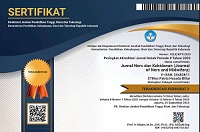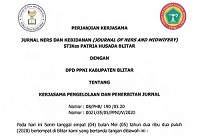The Effect of Behavioral Therapy with Modeling Techniques on Changes in the Adherence of Diabetes Mellitus Patients
DOI:
https://doi.org/10.26699/jnk.v8i3.ART.p360-367Keywords:
Behavioral Therapy, Modeling Techniques, Adherence, Diabetes MellitusAbstract
Diabetes Mellitus (DM) is a disease whose prevalence is not infectious increases with changes in lifestyle. If not managed properly, it will cause various complications that reduce quality of life, increase morbidity and mortality, and harm the economy. The success of DM management is strongly influenced by the patient's adherence to medication and diet. One of the interventions to improve the adherence of DM sufferers is Behavior Therapy with modeling techniques. The purpose of this study was to analyze the effect of behavioral therapy with modeling techniques on changes in adherence of DM patients. The design of this study was quasy-experimental with pretest posttest and control group, on a sample of 40 DM patients with consecutive sampling technique. The intervention was carried out in 4 sessions for 2 weeks. The results of the statistical test paired sample t-test and independent sample t-test obtained p <0.5 (0.000), which meant that there was an effect of behavioral therapy with modeling techniques on changes in adherence DM patient. Changes in compliance that occurred between before and after the intervention was 16.95 points. Modeling technique is behavioral learning through observation of a model who has successfully controlled his illness to emphasize changes in mindset, beliefs, and commitment to a person's new positive behavior. Modeling has an impact not only on imitating, but also adding or subtracting the observed behavior, so that it can be applied to obtain new behavior, leave old negative behavior, and maintain the desired behavior.References
Abidin, Z. (2018). Health Education dengan Pendekatan Social Media Reminder dan Audiovisual terhadap Kepatuhan dan Kadar Glukosa Darah Pasien DM Tipe 2 di Rumah Sakit Universitas Airlangga Surabaya.
American Diabetes Association (AD). (2017). Panduan Terbaru ADA 2017 Berfokus pada Pendekatan Holistik.
Assad G, Sadegian, M, Lau R, Xu Y, Contreras D.C, Bell R.C, Chan, C. . (2015). The reliability and validity of the perceived dietary adherence questionnaire for people with type 2 diabetes. Nutrients, 7, 5484–5496. https://doi.org/10.3390/nu7075231
Bisri, M., Purwanto, E., Japar, M. (2018). The effectiveness of group counselling with modelling technique to improve self-efficacy in senior high school students decision making of study continuation. Jurnal Bimbingan Konseling, 7(1), 17–22. https://doi.org/10.15294/jubk.v7iL
Izza, Elfa Lailatul.. (2019). Kepatuhan Penderita Diabetes Mellitus Tipe-2 Yang Menjalani Terapi Diet Ditinjau Dari Theory of Planned Behaviour. PROGRAM STUDI MAGISTER KEPERAWATAN. Universitas Airlangga.
Kementerian Kesehatan RI. (2019). Hari Diabetes Sedunia Tahun 2018.
Kementerian Kesehatan RI. (2020). Tetap Produktif, Cegah, dan Atasi Diabetes Melitus. Kementerian Kesehatan RI.
Munir, A. (2018). Teknik modelling sebagai upaya penanganan untuk mengurangi perilaku adiktif smartphone pada anak di Kelurahan Teritip, Kota Balikpapan, Kalimantan Timur. Universitas Islam Negeri Sunan Ampel Surabaya.
Nengsih, Novida. (2019). Pengaruh Terapi Modeling Partisipan Terhadap Kepatuhan dalam Minum Obat Pasien Skizofrenia di Rumah Sakit Jiwa Daerah Provinsi Jambi Tahun 2018. Scientia Journal, 8(1), 241–247.
Pambudi, A.T., Mulawarman, Japar, M. (n.d.). Psychoeducational group with modelling technique to improve career adaptability through career decision self efficacy. Jurnal Bimbingan Konseling, 8(1), 20–31. https://doi.org/10.15294/jubk.v8i1.26617
Rahmah, H. S. (2019). Behavioral Therapy dengan Teknik Modelling untuk Meningkatkan Self Efficacy Rendah pada Seorang Karyawan di Perusahaan Faza Grafis Sidoarjo. Universitas Islam Negeri Sunan Ampel Surabaya.
Smith, H. (2018). The Use of Video Modelling to Reduce Fear, and Teach Appropriate Response and Safe Behaviours in Children with Autism Spectrum Disorder wit a Fear of Dogs (Issue August). University of Canterbury.
Sulistyana, C. S. (2020). Peer Support for Dietary Compliance Patients with Diabetes Mellitus. 7(3), 432–438. https://doi.org/10.26699/jnk.v7i3.ART.p432
Susanti dan Sulistyana, Caturia Sasti. (2020). Pengaruh Coaching Support Terhadap Kepatuhan Penderita Chronic Kidney Disease ( CKD ). 5(4).
Thomas, J.J., Moring, J.C., Harvey, T., Hobbs, T., Lindi, A. (2016). Risk of type 2 diabetes: health care provider perceptions of prevention adherence. Applied Nursing Study. Elseviier, 32, 1–6. https://doi.org/10.1016/j.apnr.2016.03.002
Downloads
Published
How to Cite
Issue
Section
License
Copyright (c) 2021 Jurnal Ners dan Kebidanan (Journal of Ners and Midwifery)

This work is licensed under a Creative Commons Attribution-ShareAlike 4.0 International License.






